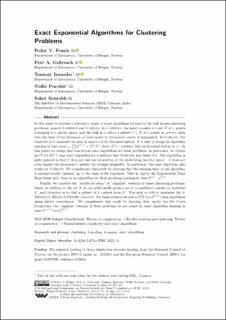| dc.contributor.author | Fomin, Fedor | |
| dc.contributor.author | Golovach, Petr | |
| dc.contributor.author | Inamdar, Tanmay Nitin | |
| dc.contributor.author | Purohit, Nidhi | |
| dc.contributor.author | Saurabh, Saket | |
| dc.date.accessioned | 2023-01-10T07:53:33Z | |
| dc.date.available | 2023-01-10T07:53:33Z | |
| dc.date.created | 2023-01-03T16:21:46Z | |
| dc.date.issued | 2022 | |
| dc.identifier.issn | 1868-8969 | |
| dc.identifier.uri | https://hdl.handle.net/11250/3042138 | |
| dc.description.abstract | In this paper we initiate a systematic study of exact algorithms for some of the well known clustering problems, namely k-MEDIAN and k-MEANS. In k-MEDIAN, the input consists of a set X of n points belonging to a metric space, and the task is to select a subset C ⊆ X of k points as centers, such that the sum of the distances of every point to its nearest center is minimized. In k-MEANS, the objective is to minimize the sum of squares of the distances instead. It is easy to design an algorithm running in time max_{k ≤ n} {n choose k} n^𝒪(1) = 𝒪^*(2ⁿ) (here, 𝒪^*(⋅) notation hides polynomial factors in n). In this paper we design first non-trivial exact algorithms for these problems. In particular, we obtain an 𝒪^*((1.89)ⁿ) time exact algorithm for k-MEDIAN that works for any value of k. Our algorithm is quite general in that it does not use any properties of the underlying (metric) space - it does not even require the distances to satisfy the triangle inequality. In particular, the same algorithm also works for k-Means. We complement this result by showing that the running time of our algorithm is asymptotically optimal, up to the base of the exponent. That is, unless the Exponential Time Hypothesis fails, there is no algorithm for these problems running in time 2^o(n)⋅n^𝒪(1).
Finally, we consider the "facility location" or "supplier" versions of these clustering problems, where, in addition to the set X we are additionally given a set of m candidate centers (or facilities) F, and objective is to find a subset of k centers from F. The goal is still to minimize the k-Median/k-Means/k-Center objective. For these versions we give a 𝒪(2ⁿ (mn)^𝒪(1)) time algorithms using subset convolution. We complement this result by showing that, under the Set Cover Conjecture, the "supplier" versions of these problems do not admit an exact algorithm running in time 2^{(1-ε) n} (mn)^𝒪(1). | en_US |
| dc.language.iso | eng | en_US |
| dc.publisher | Schloss Dagstuhl – Leibniz Center for Informatics | en_US |
| dc.rights | Navngivelse 4.0 Internasjonal | * |
| dc.rights.uri | http://creativecommons.org/licenses/by/4.0/deed.no | * |
| dc.title | Exact Exponential Algorithms for Clustering Problems | en_US |
| dc.type | Journal article | en_US |
| dc.type | Peer reviewed | en_US |
| dc.description.version | publishedVersion | en_US |
| dc.rights.holder | Copyright 2022 the authors | en_US |
| cristin.ispublished | true | |
| cristin.fulltext | original | |
| cristin.qualitycode | 1 | |
| dc.identifier.doi | https://doi.org/10.4230/LIPIcs.IPEC.2022.13 | |
| dc.identifier.cristin | 2100000 | |
| dc.source.journal | Leibniz International Proceedings in Informatics | en_US |
| dc.source.pagenumber | 13:1-13:14 | en_US |
| dc.relation.project | Norges forskningsråd: 314528 | en_US |
| dc.relation.project | ERC-European Research Council: 819416 | en_US |
| dc.identifier.citation | Leibniz International Proceedings in Informatics. 2022, 249, 13:1-13:14. | en_US |
| dc.source.volume | 249 | en_US |

